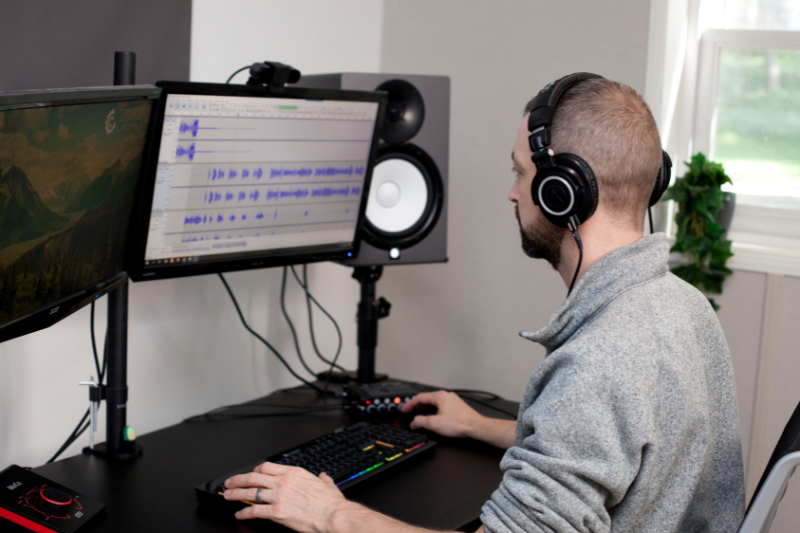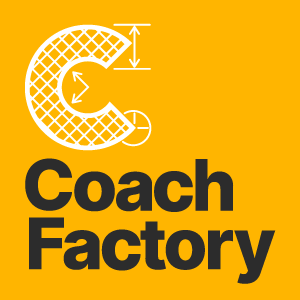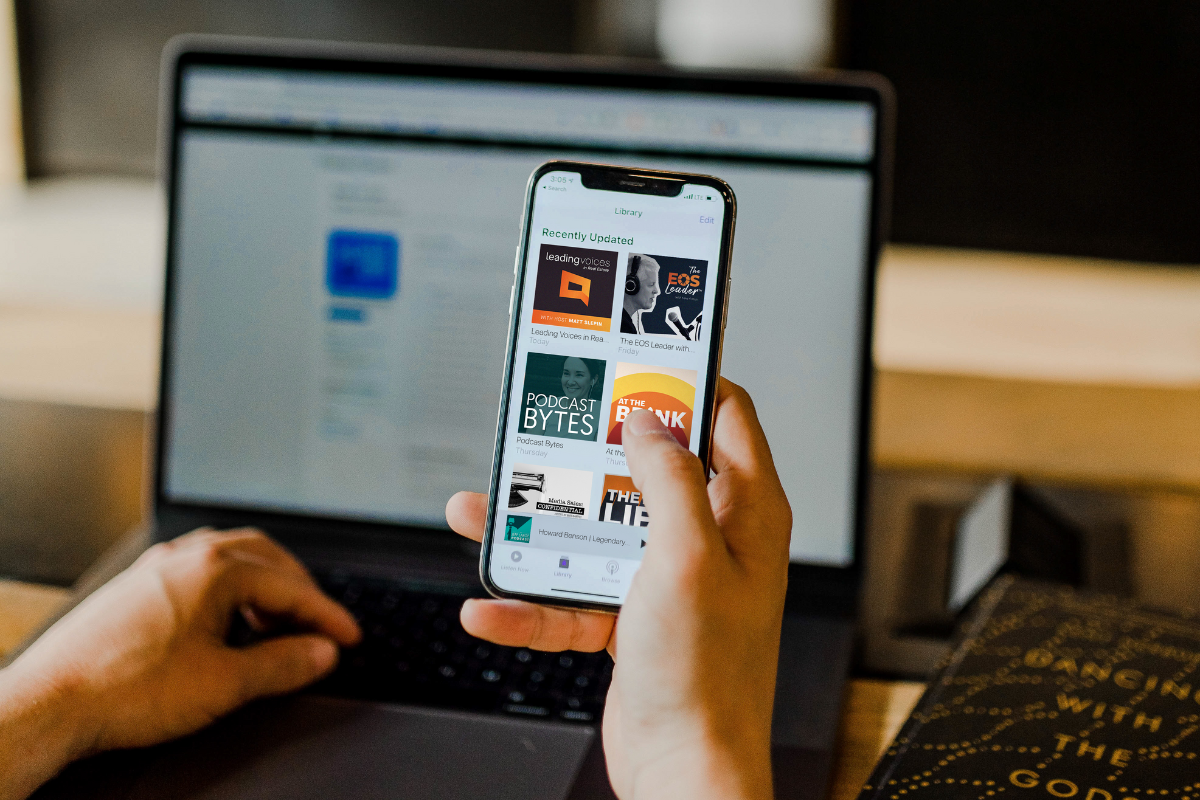Podcasting (specifically branded business podcasts) continues to grow in popularity. If you haven’t yet considered adding a branded podcast to your marketing mix, you might be missing out on a big opportunity.
Consider the following facts presented in Edison Research’s 2023 Podcast Consumer Report:
- Podcasts have more listeners in the US than ever, with approximately 89 million people listening to podcasts weekly.
- Compared to the average US population, podcast listeners are more affluent, have higher levels of education, and have higher employment rates. They are an advertiser’s dream target audience.
- 46% of monthly podcast listeners say that ads on podcasts are not intrusive, meaning they are more open to this advertising format.
This creates a number of opportunities for businesses, from reaching a wider audience to establishing thought leadership in your field. Now, I’ve been helping companies produce branded podcasts for 10+ years, and in this article, I’m going to share how a branded podcast can help you grow your bottom line.
Let’s start with the basics.
What is a branded podcast and why is it special?
A branded podcast is a lot like a regular podcast, except it’s designed and created by a company with the specific goals of the business in mind. While there are many podcasts created by influencers and individuals, branded podcasts are special because they help promote business brands. It’s a way to naturally represent your mission, establish your expertise, boost your reputation, and build trust with your target audience.
Branded podcasts can be useful for both B2B and B2C businesses. Here are some examples and why they are a great asset for each company:
- Smart Money by NerdWallet: This podcast is one of the most successful branded podcasts in terms of listenership. NerdWallet is a personal finance company that earns money by promoting financial products to its users. Each episode answers a real-world financial question, and it attracts people who could benefit from the products NerdWallet promotes.
- A Book With Legs by SMEAD Capital Management: SMEAD Capital Management advises investors who want to build wealth in the stock market. Their podcast not only appeals to their target audience, but it also uses cleverly placed ads to promote their own services.
- What Now by Wix: This is another great example of how B2B companies can use a podcast to position themselves as an authority and as thought leaders. This interview-style cast showcases how leaders are using technology to prepare their businesses for the future. It is exactly the type of show that would appeal to their ideal customers.
- Why We Eat What We Eat by Blue Apron: Blue Apron’s business is all about delivering healthy meal kits full of fresh ingredients for home cooks. With this narrative-style podcast, they create one more touch-point with their ideal audience. And, as stated on their website, it helps create “premium content for customers across its product experience to further the company’s value for lifelong learning in the kitchen.”
- Rocket Fuel by EOS Worldwide: In this interview-style podcast, one of the leaders at EOS Worldwide hosts conversations with other leaders at companies that have implemented the EOS framework. It makes it the perfect tool for networking and solidifying relationships with existing customers. EOS Worldwide is one of your clients, and we help them produce a number of their podcasts.

There are a lot of ways your business can benefit from having its own podcast. The examples I shared above showcase a variety of formats, from interviews to narrative shows and everything in between. There isn’t a single answer to what a branded podcast should look like. Instead, the format and style choices you make should support your overall marketing goals.
However, we can talk about some general benefits.
The benefits of podcasting for business.
Like any other content medium, podcasts have advantages and disadvantages. Similar to blog posts, podcasts help you establish credibility and reputation, generating loyalty and trust. But, also like publishing blog articles, podcasts are a long-term game and creating a high-quality show demands a lot of resources.
If you want to make the right decision for your company, you have to weigh the pros and the cons.
The advantages of podcasting:
- They offer an opportunity to engage with your audience on a personal level, fostering parasocial relationships and trust.
- They generate a consistent stream of content that your team can then repurpose and distribute through different channels.
- They can create additional revenue streams, if you decide to monetize them through sponsorships and advertising.
The disadvantages of podcasting.
- Producing a high-quality show requires technical skills and a significant investment in time, resources, and expertise. That’s why some businesses prefer hiring a full-service podcast producer, like us, instead of doing it all themselves.
- Measuring the return on investment (ROI) of a podcast can be challenging for businesses. You need to understand what podcast metrics are available and how to define success.
- Maintaining a successful podcast requires consistency and long-term commitment, without this you only get lukewarm results.
Because podcasting is such a resource-intensive marketing medium, it’s helpful to understand what it really takes to be successful. If you want a glimpse of all the work that goes into launching and delivering a podcast, I suggest you read my article about what full-service podcasting entails.
5 Ways you can use podcasts to grow your business.
You might be thinking, “Come on, Jeff, I know that podcasts are a great way to share stories about my brand and increase my reputation, but can they help me grow the business?”
The answer is yes, they can, when used strategically.
Over the years, I’ve helped companies use podcasts to reach their target audience, build relationships with prospects, drive traffic to their websites, and learn everything they need to know about their dream customers.
And I am now going to share four ways you can use podcasts to fuel your growth.

Jeff Large editing a podcast.
1. Podcasting helps businesses build authority.
In late 2012, my wife, cousin, and I decided to start a board game publishing company. The problem: we didn’t really know what we were doing, and no one knew who we were. Our solution was to start a podcast.
We wanted to give back before asking anyone to support us. Also, we needed to learn. Thus, our branded podcast was born.
Every episode focused on the business of board games. We interviewed game designers, graphic designers, illustrators, publishers, manufacturers, and distributors. We rubbed elbows with every major player that made the existence of board games possible.
Then a funny thing happened. We went from three people talking about board games in my basement to industry experts. Our podcast became part of the biggest podcast network in the space, The Dice Tower Network. We made legitimate connections and friendships with the people who ran companies in the industry. And strangers would come up to us at conventions to strike up conversations. Overall, the community recognized us as an authority.
According to an article from Entrepreneur, “Association is one of the most powerful tactics.” The article explains how famous people like Oprah, Tim Ferriss, and Tony Robbins used association to grow their careers.
Building authority through podcasting is not limited to entrepreneurs and personalities. The second part of the equation has to do with social proof.
Take for example one of our past clients, Conversio, an optimization and data analytics agency. When we helped them produce their One Stop Shop podcast. Each episode interviewed one of their software users, asking them about their businesses. The goal was to inspire other eCommerce business owners to see Conversio as a solution for them.
One of the major perks of interviewing Conversio’s own users was getting positive stories and recommendations for their product on every episode. And because the interviewees shared their experiences organically, it added a level of authenticity that very few other mediums can achieve.
Sources like Optinmonster stress the importance of social proof for businesses. It’s the same reason brands have case studies, reviews, and testimonials. Thanks to the podcast, Conversio received consistent and organic social proof.
2. Podcasting helps you reach new audiences.
Successful business growth depends on reaching and converting new audiences. This means you need a marketing strategy.
Traditional marketing channels, like ads, are typically intrusive and unwanted. Branded podcasts, on the other hand, allow you to develop an ongoing relationship with your audience. Plus, the Edison Research report I mentioned at the beginning of the article shows that almost half of the monthly podcast listeners believe podcast ads are not intrusive. That is uncommon with all other types of ads.
Ads and calls-to-action in podcasts are accepted and acted on. According to reports by Deloitte and Nielsen, podcast ads continue to generate positive results for businesses, from brand lift to purchase influence.
Running a branded podcast has much more opportunity than traditional marketing strategies. It allows you to tailor content directly to the people you want to attract. For my board game company, we sold board games, so we made a podcast about board games. Conversio, on the other hand, promoted its e-commerce services for business owners with a podcast full of e-commerce tips for business owners.
The list goes on.
Your podcast is your company’s voice and a natural way for listeners to learn about your company. It’s a less intrusive and shareable way to get the word out about your business. And, it’s only going to get better.
Podcast listenership is consistently growing year-over-year. It’s not a hot trend that will disappear; it’s a fundamental way that people consume media.
The better and more helpful you make your podcast, the more listeners are going to find you.
3. Podcasts enable account-based marketing.
We often think of podcasts as a great space to tell company stories, and to run non-intrusive ads. But if your goal is to establish trustful relationships with prospects, then you should consider podcasts as an account-based marketing (ABM) tool.
The easiest way to do this is through interview-style podcasts.
That’s exactly what we did when we partnered with Motivations AI to launch the Coach Factory podcast. Motivations AI has a series of personality tools and assessments that are perfect for coaches. Their podcast could have taken many directions, like interviewing personality experts and psychologists.

Instead, we decided they should focus on interviewing experienced coaches. This accomplished two goals. It created brand awareness for Motivations AI within their target audience, and it helped them establish connections with potential customers as they interviewed them.
This is just one example of how podcasts can help you spark conversations with leads. Companies like Salesforce and Shopify take similar approaches with their podcasts.
4. Podcasts help you learn more about your target audience.
A podcast can teach you more about your audience than you ever thought possible. The beauty of interviews done well is they connect you to another human’s story. They are no longer a number, statistic, or data figure. They are a person with real problems and victories.
A branded podcast can give you an avenue to unlock the truth about your audience.
This is what Aleana, co-host from One Stop Shop and customer specialist at Conversio, had to say about interviewing her own customers:
“This podcast taught me more about our customers than any hard data could have. It’s a completely different experience when you get to hear your customers’ stories as they tell them. You learn about their beginnings, their fears, their hopes. You share their little joys and victories, and you connect with them on a level that you simply couldn’t achieve with a survey. Highly recommended.”

Hosting a branded podcast helps you understand the problem your customer needs solved. You can see what your customer needs more clearly when you listen to them. When you start to identify similar problems after seasons of interviews, it’s much easier to determine what the next product, service, or feature should be.
Branded podcasts also help you understand what information your audience wants to know. You’ll also begin to see what your audience wants to learn about when they describe their struggles or with the questions they ask. This information will help you decide what kind of topics to focus on for your next blog post/podcast/ebook/video/etc.
5. Bonus reason for starting a branded podcast: better customer experiences.
According to Zendesk’s Customer Experience 2023 Trends Report, 73% of consumers will switch to a competitor after multiple bad experiences with a company. Customers appreciate when you give them a platform to be heard and celebrated, and podcasting can help you achieve this. They feel more connected to you and your company as a result of you spending time and talking with them.
A great example of this is Jaspr, a company that makes air purifiers for homes. Their podcast helps inform listeners about having a healthy home and a healthy lifestyle, furthering their mission and creating a connection with their customers.
Overall, positive customer experiences have many benefits, including reduced customer churn, a willingness to pay more for a great experience, and a higher likelihood of customer advocacy for the company.
To wrap it up.
There are many ways to determine if a new marketing tactic or strategy is worth the investment of time, money, and resources. It might be sales, customer retention, total impressions, or knowledge gained. Branded podcasts can meet all of those objectives when done well.
Over the past several years, I’ve been able to watch branded podcasts pay out for the companies I work with and for my own businesses. If you ask me, a podcast is a great addition to any omnichannel marketing strategy when planned out with the final goal in mind.
Resources and how to get started with podcasting.
If you are considering adding podcasts into your marketing mix, you can take a look at the article I wrote about how much it costs to produce a podcast. And because podcasting can be quite complex and technical, you might also want to check out this article on how to choose the right podcast producer for your business.
Finally, if you are looking for a talented full-service podcast production team, don’t look any further. Schedule a discovery call with our team and we’ll help you get started.


